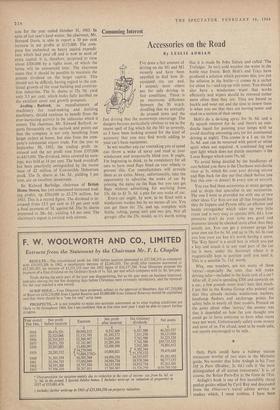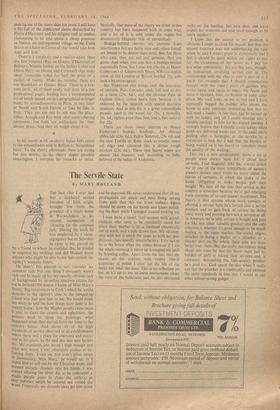Consuming Interest
Accessories on the Road
By LESLIE ADRIAN
In wet weather any car overtaking you at speed can throw a wake of spray and mud at your windscreen and temporarily blind you. It ought, I'm beginning to think, to be compulsory for all cars to have mud flaps fitted on rear wheels to prevent this. Car manufacturers will provide them as an extra. Many, unfortunately, take the opportunity to advertise the make of car by printing the name on the flaps but you can get flaps without advertising for anything from 13s. 6d. to £1 7s. 6d. a pair for any make of car.
Every car ought, by now, to be fitted with a windscreen washer but by no means all are. You can get them for 25s. and up, complete with bottle, tubing, pump unit and two jets. Not all garages offer the 25s. model, so it's worth noting that it is made by John Sidney and called 'The Trafalgar.' In very cold weather the water in the bottle may freeze. Both Holt's and Trico have produced a solution which prevents this; you put the solution in the bottle-it comes in a sachet for about Is.-and top up with water. You should also have a windscreen wiper that works efficiently and wipers should be renewed rather more often than they are. They are bound to buckle and wear out and the time to renew them is when you see that they are leaving water and mud on a section of their sweep.
Holt's do a de-icing spray for 5s. 6d. and a fly squash remover for 4s. and there's an anti- dazzle liquid for painting your lamps with to avoid dazzling oncoming cars (or for continental driving at night). This comes in a 1 oz. tin for 3s. 6d. and can be removed with petrol or white spirit when not required. A combined fog and spot light which does not dazzle oncomers 's the Lucas Ranger which costs 79s. 6d.
To avoid being dazzled by the headlamps of cars behind you there is the Charleson anti-dazzle visor at 5s. which fits over your driving mirror and flips back for day use (but check before you buy this one-it doesn't fit every size of mirror).
You can find these accessories at many garages and at shops that specialise in car accessories. The one I went to provided me with one or two other ideas. Car fires are not all that frequent but they do happen and Pyrene offer an efficient and handy extinguisher which takes tip very little room and is very easy to operate (69s. 6d.). Low pressures don't do your tyres any good' and pressures should be checked more often than they usually are. You can get a pressure gauge for your own use for 6s. 9d. and up to 18s. 6d. In case you lose your car key it's worth having a spare. The 'Key Spare' is a small box in which you put a key and attach it to any steel part of the car (as it were, under the doormat) where it is magnetically kept in position until you need it. This is a sensible 7s. .11d. worth.
Why, one wonders, are not many of these 'extras'-especially the ones that will make driving safer-included in the basic cost of a car? After all, if you're spending £500 and upwards on a car, a few pounds more won't hurt that much. I put this to the Rootes Group who pointed out that they already include windscreen washers, headlamp flashers and anchorage points for safety belts in nearly all their models. Pressed on the point about other 'extras,' the answer was that it depended on how far you thought you could go to force everyone to have what many may not want. Unfortunately safety costs money and most of us, I'm afraid, need to be made safe, not merely encouraged to be safe.
Only Paris could have a railway station restaurant worthy of two stars in the Michelin guide. No wonder that John Ardagh in his Time Of in Paris (Hodder, 2s. 6d.) calls it 'the most distinguished of all station restaurants.' It is, of course, the Relais Paris-Est at the Gare de l'Est.
Ardagh's book is one of five incredibly cheap pocket guides edited by Cyril Ray and descended from the Observer's travel advice service to readers which, I must confess, I have been making use of for more than ten years.-I still have a file full of the duplicated sheets dispatched by Pierre d'Harcourt and his diligent staff to readers clamouring to be told about a cheap pensione in Venice, an unfrequented village on the Costa Brava or a hotel in Cornwall that would take both dogs and kids.
There is a simplicity and a realism about these five first Volumes (Ray on Greece, d'Harcourt on Brittany, Ninetta Ducker on the Italian Lakes. and m Diana Petry on Devon and Cornwall) that make them irresistible value for half the • price of a packet of twenty. Make no mistake, these are not Baedekers or Guides Bleus. There is a key- note intro.. all of them really well done in a few professional pages, leading into a recommended list of hotels spaced out in a geographical arrange- ment, by arrondissements. in Paris, in two tours of North and South Devon or lake by lake in Italy. They are not out to sell you the place, either. Ardagh and Ray both offer some sobering comments, but both arc enthusiasts for their chosen place. And they all weigh about 4 oz.
In his master work on sherry Julian Jells refers to the amontillados sold in Britian as 'bastardised finds.' To the sherry aficionado these are strong but just words; to the sherry sipper possibly meaningless. 1 interpret his remarks to mean, basically, that most of the sherry we drink in this country has been tampered with in some way, and a lot of it is sold under the vague but distinctively Hispanic title of amontillado.
Bodega-bottled sherries are immune from interference but are fairly rare and, when found, are bound to be dearer than most. But, for those who care, they are not just genuine, they arc gems. And when you can buy a bodega-bottled manzanilla from San Lucar for 19s. 6d. at Henry Emberson's (I Glentworth Street, NW I ) it makes some of the London or Bristol bottled 25s. jobs look a bit extravagant.
But Emberson also brings over the aristocrat of sherries, Palo Cortado, dark, full and as dry as a bone (29s. 6d.), and the unusual Pata de Gallina (24s.), called hen's foot because it is endowed by the Spanish with special nutritive qualities. And in this list is a great amontillado pasado, aged in the wood, for 23s., a montilla, 20s. 6d., lighter even than lino, and a lino natural for There are three sweet sherries, in Henry Emberson's bodega bottlings. An oloroso abbocado (24s. 6d.), Pedro Ximenez, 23s. 6d. and the rare Tintilla de Rota, thick as treacle, sweet yet edgy and coloured like a divine cough mixture (23s. 6d.). These two heavy wines are almost like liqueurs and, according to Jeffs. beloved of the ladies of Andalusia.



































 Previous page
Previous page